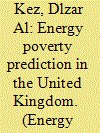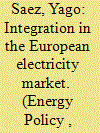| Srl | Item |
| 1 |
ID:
192749


|
|
|
|
|
| Summary/Abstract |
Energy poverty affects billions worldwide, including people in developed and developing countries. Identifying those living in energy poverty and implementing successful solutions require timely and detailed survey data, which can be costly, time-consuming, and difficult to obtain, particularly in rural areas. Through machine learning, this study investigates the possibility of identifying vulnerable households by combining satellite remote sensing with socioeconomic survey data in the UK. In doing so, this research develops a machine learning-based approach to predicting energy poverty in the UK using the low income low energy efficiency (LILEE) indicator derived from a combination of remote sensing and socioeconomic data. Data on energy consumption, building characteristics, household income, and other relevant variables at the local authority level are fused with geospatial satellite imagery. The findings indicate that a machine learning algorithm incorporating geographical and environmental information can predict approximately 83% of districts with significant energy poverty. This study contributes to the expanding body of research on energy poverty prediction and can help shape policy and decision-making for energy efficiency and social fairness in the UK and worldwide.
|
|
|
|
|
|
|
|
|
|
|
|
|
|
|
|
| 2 |
ID:
166943


|
|
|
|
|
| Summary/Abstract |
The European electricity market is immersed in an integration process that requires a fundamental transformation. In this process, Flow-Based Market Coupling, which was employed for the first time in the Central Western Europe electricity market in 2015 as a means to manage cross-border capacity allocation, is a crucial cornerstone. The novelty of this paper lies in the analysis of the price convergence or congestion across the Central Western Europe region since the Flow-Based Market Coupling was implemented. We propose using random forests to build learning models that are trained and tested with features from connected markets of this region during 2016 and 2017. These machine learning models are used for mining knowledge about our target variable, price equalization. To search for robust predictive patterns that decision-makers can use to understand congestion situations, we have tested different combinations of learning schemes, several estimators and different model parameters. The results of all implemented models are robust and reveal that promoting renewable energy can contradict the integration of the electricity market if the grid network and, in particular, the transmission lines are not adapted to the new paradigm.
|
|
|
|
|
|
|
|
|
|
|
|
|
|
|
|